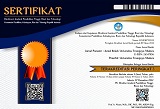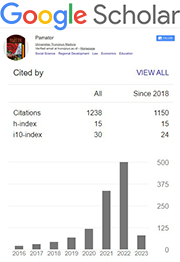Implementasi Program Sanitasi Berbasis Masyarakat di Kecamatan Kasemen Kota Serang
Abstract
The complexity of the problems, such as the uneven placement of water storage infrastructure, low public awareness of healthy living behavior, less than optimal socialization of the companion team, and weak coordination between DPOs are some of the problems that concern this study. The purpose of this study is to discuss how the implementation of the Sanimas Program in Kasemen District, Serang City and what the inhibiting factors are. The study used a qualitative descriptive approach with data collection techniques through interviews with eight informants and data analysis through the data classification process (coding data), then the results of this data classification were made labels (labeling) and then the categories were arranged. The results showed that in general the implementation of the Sanimas Program in Kasemen District, Serang City was still not successful and running optimally. This is due to unequal access to clean water, lack of community involvement and the absence of local regulations. As for the inhibiting factors from an internal perspective, namely the inadequate quantity of human resources, a lack of coordination between interested parties, and from an external perspective, it includes the socio-cultural factors of society and the geographical conditions of the environment.
Keywords
Full Text:
PDF (Bahasa Indonesia)References
Adi, I. K., & Rahdriawan, M. (2016). Kajian Partisipasi Masyarakat Dalam Pengelolaan Sanitasi Berbasis Masyarakat (Psbm) Di Kelurahan Mangunharjo, Semarang. Jurnal Pengembangan Kota, 4(2), 151. https://doi.org/10.14710/jpk.4.2.151-159
Anderson, J. (1979). Public Policy Making (Second ed). Holt, Renehart and Winston.
Chusniati, S. (2019). Implementasi Kebijakan Program Penyediaan Air Minum Dan Sanitasi Berbasis Masyarakat (Pamsimas) Di Kabupaten Trenggalek. Jurnal Mediasosian : Jurnal Ilmu Sosial Dan Administrasi Negara, 2(2), 57–64. https://doi.org/10.30737/mediasosian.v2i2.
Edward III, G. C. (1980). Implementing Public Policy. Congressional Quarterly Press.
Fischer, F., Miller, G. J., & Sidney, M. S. (2007). Handbook of Public Policy Analysis: Theory, Politics, and Methods.
Gleeson, D. H., Legge, D. G., & O’Neill, D. (2009). Evaluating health policy capacity: Learning from international and Australian experience. Australia and New Zealand Health Policy, 6(1), 1–15. https://doi.org/10.1186/1743-8462-6-3
Gleeson, D., Legge, D., O’Neill, D., & Pfeffer, M. (2011). Negotiating tensions in developing organizational policy capacity: Comparative lessons to be drawn. Journal of Comparative Policy Analysis: Research and Practice, 13(3), 237–263. https://doi.org/10.1080/13876988.2011.565912
Grindle, M. (2017). Politics and Policy Implementation in the Third World. In Princeton Legacy Library (2017th ed.).
Kemen PUPR Dirjen Cipta Karya. (2020). SURAT EDARAN DIREKTORAT JENDERAL CIPTA KARYA NOMOR : 03 / SE / DC / 2020 PEDOMAN TEKNIS LAMPIRAN. In Lampiran Sanitasi Berbasis Masyarakat.
Marume, S. B. M., Mutongi, C., & Madziyire, N. C. (2016). An Analysis of Public Policy Implementation. IOSR Journal of Business and Management, 18(4), 86–93. https://doi.org/10.9790/487X-1804018693
Merriam, S. B. (2013). Qualitative Research A Guide to Design and Implementation. Revised and Expanded from Qualitativr Research and Case Stdy Application in Education. In Journal of Chemical Information and Modeling (Vol. 53, Issue 9). https://doi.org/10.1017/CBO9781107415324.004
Mustafidah, L., Purnaweni, H., Ilmu, M., Masyarakat, K., Masayarakat, F. K., Diponegoro, U., Masyarakat, F. K., Diponegoro, U., Lingkungan, D. I., Diponegoro, U., Total, S., & Masyarakat, B. (2020). Analisis Pelaksanaan Program Sanitasi Total. 25–37
Nugroho, R. (2014). Public Policy. PT. Elex Media Komputindo.
Parsons, W. (2004). Not just steering but weaving: Relevant knowledge and the craft of building policy capacity and coherence. Australian Journal of Public Administration, 63(1), 43–57. https://doi.org/10.1111/j.1467-8500.2004.00358.x
Prayitno, J., & Widati, S. (2018). Kajian Strategi Promosi Kesehatan Sanitasi Total Berbasis Masyarakat (STBM) di Kelurahan Kejawan Putih Tambak Kota Surabaya. Jurnal Kesehatan Lingkungan, 11(3), 267–274. https://e-journal.unair.ac.id/JKL/article/download/6481/5774
Sabatier, P., & Mazmanian, D. (1979). Conceptual Framework, The Implementation of Public Policy : A Framework of Analysis.
Sitra, E., Agustar, A., & Erwin. (2019). Pelaksanaan Program Sanitasi Total Berbasis Masyarakat (Stbm) dan Implikasinya Terhadap Perubahan Perilaku Masyarakat Di Kabupaten Lima Puluh Kota. Jispo, 9(1), 344–355.
Sururi, A. (2015). Pemberdayaan Masyarakat Melalui Program Pembangunan Infrasruktur dalam Meningkatkan Kesejahteraan Masyarakat Kecamatan Wanasalam Kabupaten Lebak. Sawala Jurnal Administrasi Negara, 3(2).
Sururi, A. (2020). Collaborative Governance Actor in the Revitalization Program of Old Banten Religious Tourism Area. Policy & Governance Review, 4(2), 128. https://doi.org/10.30589/pgr.v4i2.216
Thomas, J. W., & Grindle, M. S. (1990). After the Decision : Reforms Implementing Policy in Developing Countries. World Development, 18(8), 1163–1990
Tim Pikiran Rakyat. (2020, March 21). 27,20 Persen Warga Kota Serang Masih Dolbon. Pikiran Rakyat. https://www.pikiran-rakyat.com/nasional/pr-01308606/2720-persen-warga-kota-serang-masih-dolbon (Diakses pada 08 April 2020)
UN-Habitat III. (2016). Agenda Baru Perkotaan (Issue III). https://doi.org/10.16309/j.cnki.issn.1007-1776.2003.03.004
Van Meter, D. S., & Van Horn, C. E. (1975). The Policy Implementation Process: A Conceptual Framework. Administration & Society, 6(4), 445–488. https://doi.org/10.1177/009539977500600404
Widianingsih, I. (2005). Network of Asia-Pacific Schools and Institutes of Public Administration and Governance (NAPSIPAG) Annual Conference 2005 Beijing, PRC, 5-7 December 2005 Workshop on Enlarging Citizen Participation and Increasing Local Autonomy in Achieving Societal Harmon. Workshop on Enlarging Citizen Participation and Increasing Local Autonomy in Achieving Societal Harmony Workshop.
Wu, X., Ramesh, M., & Howlett, M. (2015). Policy capacity: A conceptual framework for understanding policy competences and capabilities. Policy and Society, 34(3–4), 165–171. https://doi.org/10.1016/j.polsoc.2015.09.
Yin, R. K. (2014). Case Study Research : design and methods (Fifth Edit). SAGE Publications Inc.
Zahrina, A. F., Suryadi, & Suwondo. (2015). Implementasi Program Gerakan Sanitasi Berbasis Masyarakat dalam Pengendalian Lingkungan (Studi Kasus pada Desa Perning, Kecamatan Jatikalen, Kabupaten Nganjuk ). Jurnal Administrasi Publik, 3(11), 1832–1836.
DOI: https://doi.org/10.21107/pamator.v14i2.10975
Refbacks
- There are currently no refbacks.
Copyright (c) 2021 Jessica Lofty, Rethorika Berthanilla, Ahmad Sururi

This work is licensed under a Creative Commons Attribution-ShareAlike 4.0 International License.
Jurnal Pamator : Jurnal Ilmiah Universitas Trunojoyo by Universitas Trunojoyo Madura is licensed under a Creative Commons Attribution-ShareAlike 4.0 International License.















.png)